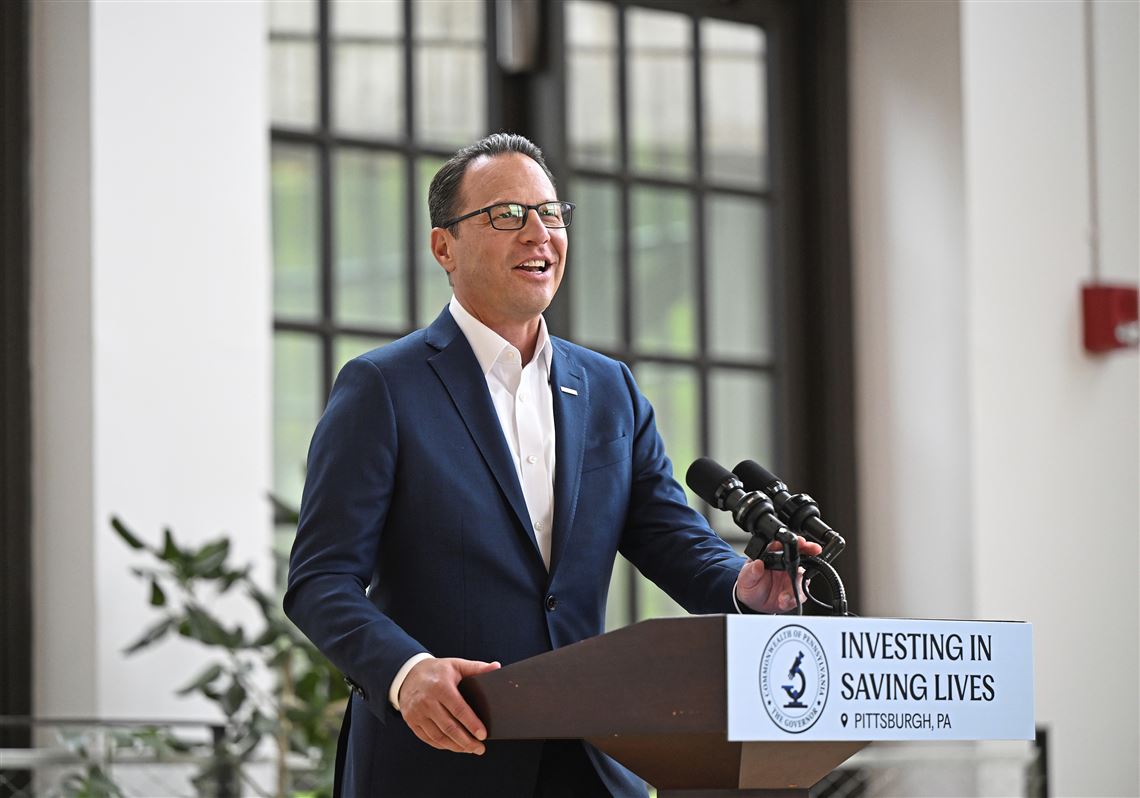In an abandoned area formerly utilized for assembling Ford vehicles in Shadyside, Governor Josh Shapiro advocated on Tuesday for allocating $50 million from this year’s state budget towards fostering growth in the life sciences sector and supporting other cutting-edge research industries.
Mr. Shapiro’s suggested budget for this year includes a dedicated allocation of $30 million for life sciences and an additional $20 million earmarked for “large-scale innovation” initiatives spanning fields such as artificial intelligence, biodiversity, and other sectors aimed at enhancing public health and quality of life, according to Mr. Shapiro and those aligned with him. This $30 million will be provided once, whereas the $20 million will serve as ongoing yearly funds to foster innovative activities across multiple industries, authorities mentioned.
Many University of Pittsburgh students gathered at The Assembly building, a collaborative area and research center, observed from an upper staircase as the governor and others discussed how those funds would prove advantageous for the Pittsburgh area and across the state.
Rory Cooper, the University of Pittsburgh’s assistant vice chancellor for research focusing on STEM-health science partnerships, mentioned that the funds allocated by the governor will be transformative, particularly for individuals like himself who rely on wheelchairs. Together with his team, they have developed technologies employed in power wheelchairs, thereby enhancing global accessibility and mobility for those who depend on such devices.
They were involved in developing the initial completely submerged wheelchairs, allowing children to utilize them at splash pads and water parks during summertime. While these have been spotted in San Antonio, Mr. Cooper hopes they will make their way to Pittsburgh as well.
The universities within the state, such as those in Pittsburgh, stand at the forefront of developing assistive technologies. As Mr. Cooper mentioned, initiatives similar to what the governor has proposed could potentially facilitate greater engagement from businesses in this field. This would ideally enable patents to spawn new enterprises based locally, keeping them anchored both in the area and statewide while also driving forward innovations capable of “reshaping the globe.”
Mr. Shapiro’s plan needs to pass through the General Assembly, where it will be considered by state Senator Jay Costa and state Representative La’Tasha D. Mayes—both local Democrats in office. Representative Mayes stated that she intends to use her role on the House Appropriations Committee to support Mr. Shapiro’s budget initiative. Meanwhile, Senator Costa expressed his hope that lawmakers from across the political spectrum would collaborate to endorse the necessary funding.
Mr. Costa, who leads the opposition in the state Senate, mentioned that despite Democrats holding just a single-seat advantage in the House and Republicans dominating in the state Senate, history shows instances where lawmakers from both prominent political parties have collaborated to successfully pass these types of budget proposals.
I can confirm that as the Democratic leader in the Senate, I guarantee we have 23 votes to push this measure across the finish line,” stated Mr. Costa, referencing the count of Democrats in the state’s upper legislative body. “We will keep collaborating with our counterparts from the opposing party since it is crucial for this entire initiative to maintain a bipartisan approach.
In response to queries from journalists, Mr. Shapiro expressed optimism regarding the progress of the budget process and the impending funding. However, he admitted that—similar to past budget talks—
He and the Republican legislators would have to find common ground to get anything approved.
Sound judgment has been evident in both of our recent budgets, as we made unprecedented investments in public safety, education, and economic growth,” stated the governor. “I’m now concentrating again on these fundamental areas, and I am pleased to have achieved this.
The governor along with others such as Allegheny County Executive Sara Innamorato, Pennsylvania Department of Community and Economic Development Secretary Rick Siger, and Megan Shaw, who leads the Pittsburgh Life Sciences Greenhouse organization, emphasized the significance of these potential investments—particularly considering President Donald Trump’s administration’s threats to withhold or cut off federal support for several research institutions across the country, including those within the Pittsburgh area.
“The innovation program outlined here is a down payment on a huge economic opportunity for this state, facilitating innovation and enhancing a path to commercialization and job creation,” Ms. Shaw said.
In response to questions from journalists, Mr. Shapiro stated that his suggested financing aims to facilitate collaboration between academic institutions and industry players. This includes optimizing the utilization of patents created by university students and ensuring these innovations are commercialized within their local regions or states rather than primarily in thriving tech centers such as the San Francisco Bay Area or Boston.
He further mentioned his dedication to supporting universities regarding financial aid and research initiatives, even within the present circumstances under President Trump’s administration.
A student inquired about protecting the state’s universities from potential cuts to federal funding under the Trump administration.
$2.6 billion in grant money alongside Harvard University
.
The governor stated that it’s “an issue” for states like Pennsylvania because the federal government is holding back funding from essential organizations involved in research and fostering economic growth. He emphasized his unwavering support for universities across Pennsylvania, mentioning that his administration has filed lawsuits with the intention of safeguarding the federal financial assistance intended for these entities.
to various state agencies
.
“I will keep doing this for all of our institutions here in Pittsburgh and throughout the state,” the governor stated.







